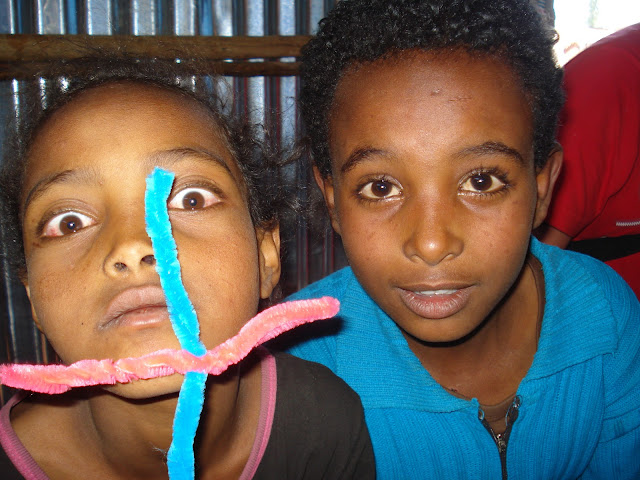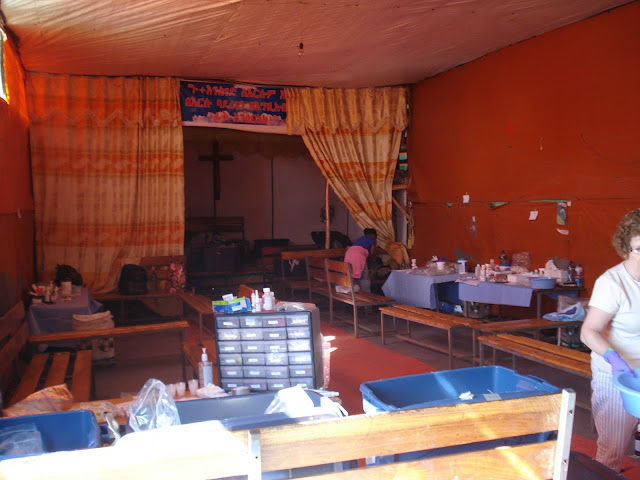This day was definitely an interesting one in terms of patients. We had one woman who was in our back “private” area for quite some time. She came in and was 8 or 9 months pregnant. Using a translator (our high school helpers were always so professional and mature during some of these hard cases) Stephanie and Samme tried to discern if her water had broken. Apparently she was 2 cm dilated and had been leaking for a few days. I believe the diagnosis was that her water had broken and the baby had been without amniotic fluid, so she was sent to the hospital. Her name was Helen and last we heard (days ago) she was undergoing an emergency C-section. While I was hoping to have a new little life make an appearance right there (and I totally would have been a part of that), we caught something that could have been detrimental to that little baby’s life. I hope things are going well for her and her (hopefully) healthy new baby.
 |
| Two of our wonderful translators |
Also during this clinic, I was able to sneak away from the pharmacy and sit in triage for a while working with some kids on crafts. The Bright Hope kids came for their physicals today, and I was supposed to spend the day with them, just hanging out. But no one let me know they were here or where to go to set up, so I only spent a few minutes with them. Pastors little daughter Lydia had come to be seen, and she was standing by the door with Kathleen as I was making my way. She was a beautiful little child and I stopped to talk to her. She grabbed my hand and I ended up sitting in the doorway while her small adept fingers began braiding my bangs. At one point she was trying to pull my hair out of my ponytail to braid it. Her work was small and didn’t stay very well, but it was great.
After visiting with Lydia, I made my way next door with a bag full of crafts. There were only 6 or so kids over there, so I started passing out necklaces and bracelets and tried to figure out a way to communicate with them. It was interesting trying to find a way to show the kids how to make the jewelry and let them know that it was ok to start making them now. That was really a challenge, trying to overcome that language barrier. It was funny to watch the kids too, who would often take the packet and put it in a pocket, only to stick their hand out and ask for more. If I told them they already got one, they would make a comment like “for my sister” or “for my mother”. Of course, I gave them extra, but only after feigning a bit of scolding. The kids were also eyeing some pipe cleaners, which I handed out to make more bracelets. Their little wrists were so small, we folded them over a few times to make them fit. One little girl took the pipe cleaners and made a little figure out of them. Each time the figure talked, she would use a different, higher pitched, childlike voice. It was very interesting to see that part of kid-dom, especially girls, translate cross culturally.
We only did a few of the crafts before the kids were called away to go back to the school. They were all super cute and fun, and I wish I was more confident in myself in order to be able to enjoy them more. I was worried about not being able to communicate with them, or not having enough crafts, or any number of other things that really probably didn’t matter much at all. Janet’s grandkids had also made the cutest things to pass out. They had sent bottle cap necklaces. The strings were made from old t-shirts, the caps came from oriental trading, and the mom had put small images on the caps. Super cute idea that I totally think I am going to borrow for my elementary schoolers. Also, Charisse had put ribbons around the wide rubber band bracelets and made beautiful hair bows or bracelets for the girls.
 |
| Craft time |
After clinic today we went back to the Guest House to “freshen up” before heading out to go shopping. I didn’t shower or anything like that because I didn’t see the point, it’s not like you could ever really get clean it seemed. There’s a smell that accompanies you from Korah. Not a bad smell, but dusty, unclean. And there’s dirt constantly under your fingernails, no matter how many times you wash your hair. I didn’t get under my fingernails clean until a few days after I got home. I didn’t shower until Monday night after returning home and when I took my hair down to wash it, it still smelled of Korah. I got a little sad washing it out, a part of me feeling like I should be keeping that with me as a reminder. Maybe even as proof that I had actually come and gone from this place.
Shopping was an interesting experience. There are small shacks lined up on a street, sharing walls, all selling scarves and clothing, shoes and cds. The street is shared with a primary school, so there were children wandering in groups in various colored school uniforms. They all wanted to stop and touch you, asking you how you are either in Amharic or English. They were forever looking at you. Sometimes they would say something in Amharic and then turn towards their friends and laugh before continuing on. At one point, our small group got spit at by at least one child. Reason for this reaction is unknown. While we were making our way to the shopping street, I saw something I’ve never seen before – a woman squatting in the gutter, skirt hiked, doing her business. Despite all the men who utilize nature as a public toilet, this woman was the first and only one I’d seen do it. I wonder if it is a source of shame for them where it’s not for the men. What made her decide it was ok to squat in public – could she just not hold it? Is it really socially acceptable and we just hadn’t seen anyone up to that point?
While shopping we tried to stay together and keep an eye on each other. We all had “buddies” that we tended to hang around with and we worked to make sure that if someone deviated from the group they had hooked up with someone else from the team. At one point, Beth and I were walking on the far side of the street, where the shops were a bit farther away from the road, and we had turned around to check on a group member. Walking a few steps behind us was Sami driver. That touched me in a way that I cannot even fully express. Amidst this crowded street, in a foreign country where sometimes very foreign things go on (like a meat stall where the meat is cut fresh off the bone, and people wait in line for it outside of the little detached shack on the side of the road in front of some shops), and here was this familiar face walking with us and protecting us without our knowledge. Saying goodbye to Sami at the airport I told him how much this meant to me and my eyes got a little teary. It doesn’t help that I think it speaks highly of a man who is willing to protect a woman and that is a prominent quality I long for in a husband.
We spent a little bit of time shopping on the street here but there wasn’t much to do for the amount of time we had. A lot of the shops were selling similar items and it was kind of that mentality where if you’ve seen one you’ve seen them all. I bought a beautiful green skirt for 200 birr. Our group reconvened more quickly than we were supposed to so we piled into the vans and headed off to another shopping location. Sumer knew of this place outside the city that acts as a refuge for women with HIV/AIDS. It’s a church with a fountain that many believe has healing powers. The women I think have the ability to live on the church property but I know that they work to make goods that are sold there and help to benefit the church and the program. I bought two necklaces with orthodox crosses on them that match, one for me and one for my brother, and two pairs of earrings, one for mom and one for Emily.
After shopping we made our way to Island Breeze, a restaurant owned by Americans that offered a lot of the tastes of home. (Before we turned down the street that Island Breeze was on, I saw the weirdest sight that perhaps gave me my only culture shock experience in Ethiopia. We made a right hand turn down the street before turning left into the Island Breeze parking lot. Just before that right hand turn, on the right was a bright yellow shop, carrying nothing but DeWalt power tools. I’ve never seen anything like that in America, much less in a poverty-inflicted country). Anyway, Island Breeze had a really cute and laid back atmosphere and an awesome brick oven where they made their pizzas. I ordered a ranch chicken wrap, but the chicken was breaded and not grilled and a little over done. It wasn’t fantastic but it was nice to at least recognize something on the menu. We had a large party but dinner took more than 2 hours if I remember correctly and by the time we left I think we were all ready to go home. Of course the night concluded with some Bananagrams but with a larger group than our normal three or four. It was fantastic and I felt like it was really a time when we got to bond as a team.
 |
| Island Breeze |






































